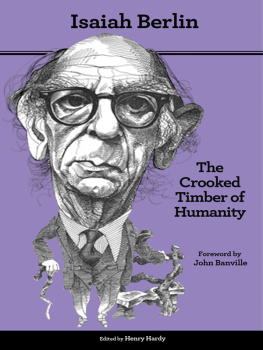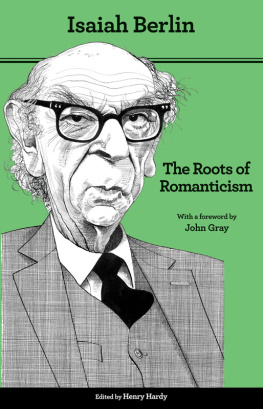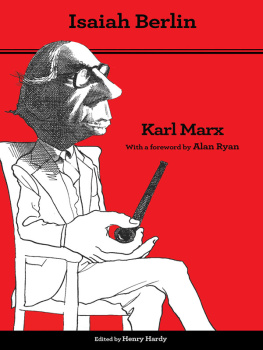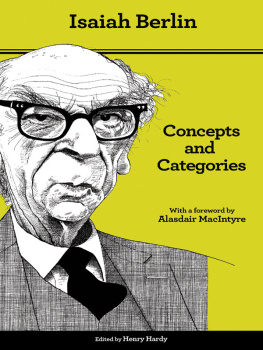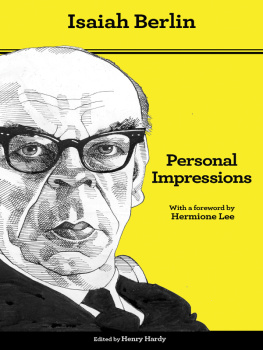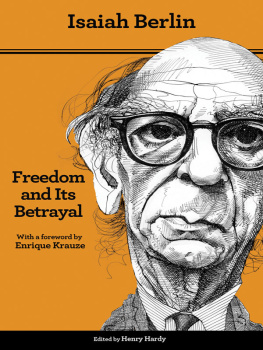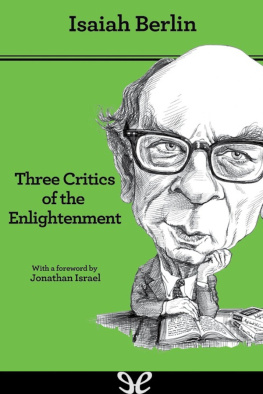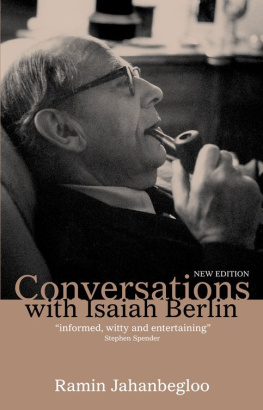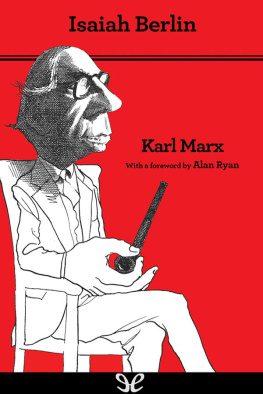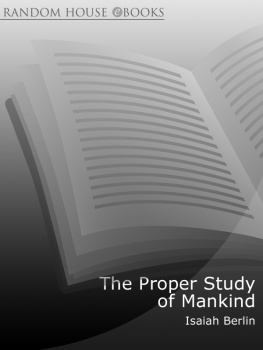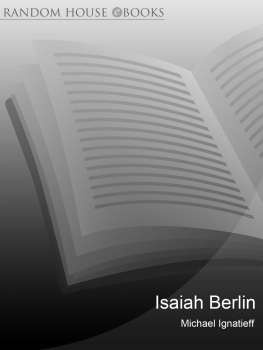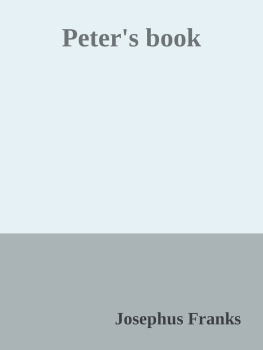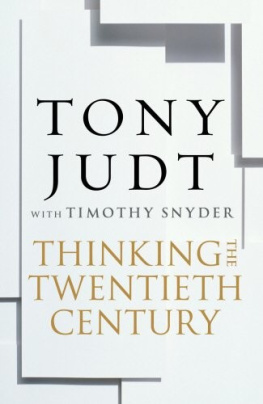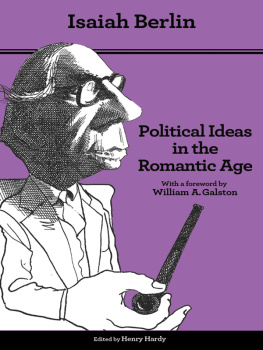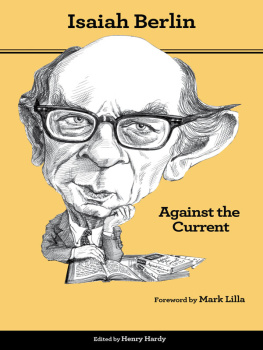
THE CROOKED TIMBER OF HUMANITY
ISAIAH BERLIN WAS BORN IN RIGA, now capital of Latvia, in 1909. When he was six, his family moved to Russia; there in 1917, in Petrograd, he witnessed both Revolutions Social Democratic and Bolshevik. In 1921 his family came to England, and he was educated at St Pauls School, London, and Corpus Christi College, Oxford.
At Oxford he was a Fellow of All Souls, a Fellow of New College, Professor of Social and Political Theory, and founding President of Wolfson College. He also held the Presidency of the British Academy. In addition to The Crooked Timber of Humanity, his main published works are Karl Marx, Russian Thinkers, Concepts and Categories, Against the Current, Personal Impressions, The Sense of Reality, The Proper Study of Mankind, The Roots of Romanticism, The Power of Ideas, Three Critics of the Enlightenment, Freedom and Its Betrayal, Liberty, The Soviet Mind and Political Ideas in the Romantic Age. As an exponent of the history of ideas he was awarded the Erasmus, Lippincott and Agnelli Prizes; he also received the Jerusalem Prize for his lifelong defence of civil liberties. He died in 1997.
Henry Hardy, a Fellow of Wolfson College, Oxford, is one of Isaiah Berlins Literary Trustees. He has edited (or co-edited) many other books by Berlin, including the first three volumes of his letters, and is currently working on the remaining volume. John Banvilles novels include The Book of Evidence and The Sea, which won the 2005 Man Booker Prize, and, most recently, The Infinities. He is a longstanding enthusiast for Berlins writing, and has reviewed many of his books for the Irish Times.
For further information about Isaiah Berlin visit
ALSO BY ISAIAH BERLIN
*
Karl Marx
The Hedgehog and the Fox
The Age of Enlightenment
Russian Thinkers
Concepts and Categories
Personal Impressions
Against the Current
The Sense of Reality
The Proper Study of Mankind
The Roots of Romanticism
The Power of Ideas
Three Critics of the Enlightenment
Freedom and Its Betrayal
Liberty
The Soviet Mind
Political Ideas in the Romantic Age
Unfinished Dialogue
with Beata Polanowska-Sygulska
Unfinished Dialogue
*
Flourishing: Letters 19281946
Enlightening: Letters 19461960
Building: Letters 19601975
THE CROOKED TIMBER OF HUMANITY
CHAPTERS IN THE HISTORY OF IDEAS

ISAIAH BERLIN
Edited by Henry Hardy
Second Edition
Foreword by John Banville
PRINCETON UNIVERSITY PRESS
PRINCETON AND OXFORD
Published in the United States of America, its Colonies and Dependencies, the Philippine Islands, and Canada by Princeton University Press, 41 William Street, Princeton, New Jersey 08540
Requests for permission to reproduce material from this work should be sent to Permissions, Princeton University Press
press.princeton.edu
First published by John Murray 1990 First published in the US by Alfred A. Knopf 1991 Second edition published by Princeton University Press 2013
Copyright Isaiah Berlin 1947
Isaiah Berlin 1959, 1972, 1975, 1978, 1980, 1983, 1988, 1990, 1992, 2004, 2013
Selection and editorial matter Henry Hardy 1990, 2003, 2011, 2013
Foreword John Banville 2013
The moral right of Isaiah Berlin and Henry Hardy to be identified as the author and editor respectively of this work has been asserted
All Rights Reserved
Library of Congress Cataloging-in-Publication Data
Berlin, Isaiah, 19091997.
The crooked timber of humanity : chapters in the history of ideas / Isaiah Berlin ; edited by Henry Hardy ;
foreword by John Banville. Second edition.
pages cm
Includes index.
ISBN 978-0-691-15593-7 (pbk. : alk. paper) 1. Philosophy. 2. Civilization, Modern. I. Title.
B29.B4465 2013
190dc23
2012035271
British Library Cataloging-in-Publication Data is available
This book has been composed in Garamond Premier Pro
Printed on acid-free paper 
Printed in the United States of America
1 3 5 7 9 10 8 6 4 2
For Jon Stallworthy
[A]us so krummem Holze, als woraus der Mensch gemacht ist, kann nichts ganz Gerades gezimmert werden.
Out of the crooked timber of humanity no straight thing was ever made.
Immanuel Kant
The translation given above is IBs customary one. More literally: Out of timber as crooked as that from which man is made nothing entirely straight can be built. Immanuel Kant, Idee zu einer allgemeinen Geschichte in weltbrgerlicher Absicht (Idea for a Universal History with a Cosmopolitan Purpose, 1784), Kants gesammelte Schriften (Berlin, 1900 ), viii 23. 22; see also xi below. Cf. Ecclesiastes 7. 13: Consider the work of God: for who can make that straight, which he hath made crooked?
CONTENTS
FOREWORD
John Banville
ISAIAH BERLIN WAS ONE of the most exciting thinkers of the twentieth century, and the essays in this volume, written over three decades, from the end of the 1950s to the 1980s, address some of the most urgent topics of our time. The excitement derives immediately from Berlins unique tone of voice, which is the same on the page as it was in the lecture hall or before the microphone. He spoke with terrifying rapidity Joseph Brodsky said his English was even faster than his Russian, courting the speed of light
The result, for reader as for listener, brings on a curious kind of giddiness, a sensation of fizzing intellectual delight, as if one were being whirled round and round on a marvellously noisy carousel. Who would have thought a book subtitled Chapters in the History of Ideas would afford so much fun?
From the start Berlin was cast into the thick of things, and stayed there for the rest of his long life. He was born in 1909 in Riga, a former Hanseatic trading port and the capital of what is now Latvia and was then a province of the Russian empire. He was the only surviving child of a wealthy Jewish couple who later moved to Petrograd St Petersburg where they lived through the February and October Revolutions of 1917. The young Isaiah retained vivid memories of these events. In February he witnessed the anti-tsarist crowd surging through the streets on the way to storm the Winter Palace, and although he was only seven he understood something of the revolutionary euphoria that was sweeping the city.
The experience that left the most profound impression, however, was a brush with mob violence that he had one day at the end of the February Revolution when he was out for a walk with his governess. He remembered stopping to examine a volume by Jules Verne on sale on a pavement bookstall when a gang of men rushed past dragging a terrified policeman off to be lynched. Michael Ignatieff writes: Much later, in the 1930s, when contemporaries were intoxicated with revolutionary Marxism, the memory of 1917 continued to work within Berlin, strengthening his horror of physical violence and his suspicion of political experiment, and deepening his lifelong preference for all the temporising compromises that keep a political order safely this side of terror.
By the 1930s the Berlins were settled in London, to which they had emigrated in 1921. Isaiah was eleven when the family came to Britain, and spoke hardly any English he knew some forty English words, he later said, including the lyrics of
Next page
